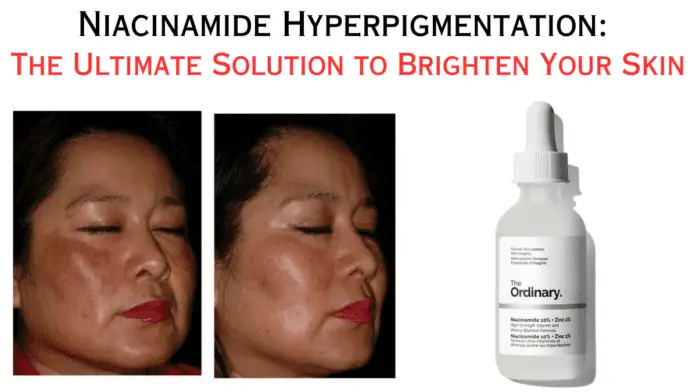
If you’re struggling with hyperpigmentation, you’re not alone. This common skin condition affects millions of people worldwide and can leave you feeling self-conscious about your appearance. But there’s good news: niacinamide hyperpigmentation treatments are gaining popularity as an effective solution to help you achieve brighter, more even-toned skin. In this comprehensive guide, we will explore how niacinamide works, its benefits for treating hyperpigmentation, and how to incorporate it into your skincare routine. Let’s dive in!
Understanding Hyperpigmentation
Hyperpigmentation is a common skin condition where patches of skin become darker than the surrounding areas due to increased melanin production. Melanin is the pigment responsible for the color of our skin, hair, and eyes. Factors that can lead to hyperpigmentation include sun exposure, hormonal changes, inflammation, and skin injuries.
What is Niacinamide?
Niacinamide, also known as nicotinamide, is a form of vitamin B3. This essential nutrient has been clinically proven to improve various skin conditions, including acne, rosacea, and, of course, hyperpigmentation. Niacinamide is a popular skincare ingredient found in serums, creams, and even oral supplements.
How Niacinamide Treats Hyperpigmentation
Niacinamide works in several ways to reduce hyperpigmentation:
- Inhibiting melanosome transfer: Melanosomes are cellular structures that contain melanin. Niacinamide helps to inhibit the transfer of melanosomes from melanocytes (melanin-producing cells) to keratinocytes (skin cells), resulting in a more even skin tone.
- Reducing inflammation: Inflammation can stimulate melanin production and contribute to hyperpigmentation. Niacinamide’s anti-inflammatory properties help to calm the skin and minimize redness, which in turn reduces melanin production.
- Increasing cell turnover: Niacinamide promotes the natural exfoliation process, helping to remove melanin-filled skin cells and reveal brighter, healthier-looking skin.
Read: Niacinamide and Salicylic Acid: Can You Mix Them?
Benefits of Niacinamide for Skin
Apart from treating hyperpigmentation, niacinamide offers numerous other benefits for your skin, including:
- Improves skin barrier function: Niacinamide strengthens the skin’s lipid barrier, which helps to retain moisture and protect against environmental damage.
- Reduces fine lines and wrinkles: By stimulating collagen production, niacinamide can help to reduce the appearance of fine lines and wrinkles.
- Minimizes pore appearance: Niacinamide helps to regulate sebum production, which can reduce the appearance of enlarged pores.
- Soothes sensitive skin: Due to its anti-inflammatory properties, niacinamide is suitable for even the most sensitive skin types.
Incorporating Niacinamide Into Your Skincare Routine
To incorporate niacinamide into your skincare routine, follow these steps:
- Choose the right product: Look for products with a concentration of 5% to 10% niacinamide for optimal results. Serums and creams are popular choices due to their ease of application and absorption.
- Apply consistently: For best results, apply niacinamide products daily. Consistency is key in achieving visible improvements in hyperpigmentation.
- Use sunscreen: Sun exposure can worsen hyperpigmentation, so always use a broad-spectrum sunscreen with at least SPF 30 when using niacinamide products.
Read the Review and Buy: Neutrogena Niacinamide Serum
Potential Side Effects of Niacinamide
Niacinamide is generally considered safe for all skin types, including sensitive skin. However, some individuals may experience mild side effects such as redness, itchiness, or irritation. If these symptoms occur, discontinue use and consult a dermatologist.
Read: Lactic Acid and Niacinamide
FAQs
Q: Can I use niacinamide with other active ingredients?
A: Yes, niacinamide is compatible with most active skincare ingredients, including retinol, alpha hydroxy acids (AHAs), and vitamin C. However, it’s essential to patch-test and introduce new products gradually to avoid potential irritation.
Q: How long does it take to see results from niacinamide hyperpigmentation treatments?
A: It can take several weeks to months to see noticeable improvements in hyperpigmentation. Consistent use and patience are crucial for achieving the desired results.
Q: Can I use niacinamide while pregnant or breastfeeding?
A: Niacinamide is considered safe for use during pregnancy and breastfeeding. However, it’s always best to consult your healthcare provider before introducing new skincare products during these periods.
Conclusion
In conclusion, niacinamide hyperpigmentation treatments offer a promising solution for those looking to achieve brighter, more even-toned skin. With its multiple benefits and minimal side effects, niacinamide is an excellent addition to any skincare routine.











